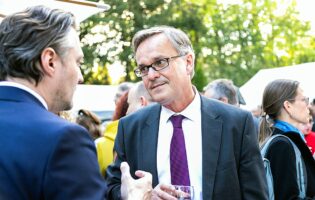
Constructive Power and Reconciliation: The Importance of German Societal Organizations

Lily Gardner Feldman
Senior Fellow
Dr. Lily Gardner Feldman is a Senior Fellow at AICGS. She previously served as the Harry & Helen Gray Senior Fellow at AICGS and directed the Institute’s Society, Culture & Politics Program. She has a PhD in Political Science from MIT.
From 1978 until 1991, Dr. Gardner Feldman was a professor of political science (tenured) at Tufts University in Boston. She was also a Research Associate at Harvard University’s Center for European Studies, where she chaired the German Study Group and edited German Politics and Society; and a Research Fellow at Harvard University’s Center for International Affairs, where she chaired the Seminar on the European Community and undertook research in the University Consortium for Research on North America. From 1990 until 1995, Dr. Gardner Feldman was the first Research Director of AICGS and its Co-director in 1995. From 1995 until 1999, she was a Senior Scholar in Residence at the BMW Center for German and European Studies at Georgetown University. She returned to Johns Hopkins University in 1999.
Dr. Gardner Feldman has published widely in the U.S. and Europe on German foreign policy, German-Jewish relations, international reconciliation, non-state entities as foreign policy players, and the EU as an international actor. Her latest publications are: Germany’s Foreign Policy of Reconciliation: From Enmity to Amity, 2014; “Die Bedeutung zivilgesellschaftlicher und staatlicher Institutionen: Zur Vielfalt und Komplexität von Versöhnung,” in Corine Defrance and Ulrich Pfeil, eds., Verständigung und Versöhnung, 2016; and “The Limits and Opportunities of Reconciliation with West Germany During the Cold War: A Comparative Analysis of France, Israel, Poland and Czechoslovakia” in Hideki Kan, ed., The Transformation of the Cold War and the History Problem, 2017 (in Japanese). Her work on Germany’s foreign policy of reconciliation has led to lecture tours in Japan and South Korea.
The Importance of German Societal Actors
The Euro-zone crisis has focused international attention on Germany’s power, depicting the Federal Republic either as selfless savior (constructive power) or as dictatorial demon (dominant power), depending on observers’ nationality and profession. The spotlight has turned mainly on the motivations and maneuverability of Chancellor Angela Merkel and the German government. However, the political elite’s choices are essentially driven by its perceptions of German society’s economic and financial policy preferences, shaped in good measure by lessons from Germany’s pre-war past.
The importance of German societal organizations’ attitudes in today’s financial and economic crisis—whether industry, banks, the German “Occupy Wall Street” movement, or trade unions—provides an opportunity to think more broadly about the role of societal actors in Germany’s efforts over six decades to learn from its history. Reconciliation with former enemies has been a leitmotif of German foreign policy since 1949, and institutionalized, non-governmental actors have played a key role in Germany’s transformation from pariah nation to respected member of the international community, both in Europe and beyond. This panoramic view of Germany’s acceptability among neighbors is more telling about German power than the snapshot impression rendered by Hitler masks in the Greek anti-German demonstrations surrounding the terms of a financial bail-out for Athens.
German Societal Actors Confronting the Past through Reconciliation
German societal organizations were early players in Germany’s international reconciliation, often acting as catalysts for later German official initiatives. With France, Israel, Poland, and Czechoslovakia/the Czech Republic, religious actors—the Protestant and Catholic churches, Action Reconciliation/Service for Peace (Aktion Sühnezeichen/Friedensdienste), the Societies for Christian-Jewish Cooperation (Gesellschaften für christlich-jüdische Zusammenarbeit)—took important first steps to forge new relationships with external victims of Nazism. They were joined by organizations devoted to the examination of German history (German Historical Institutes; bilateral textbook commissions); friendship societies; economic entities; cultural actors; and youth, educational, and research exchange organizations in building cross-border, broad societal connections that complemented the reconciliation activities of German governments.
German political foundations have been unique non-governmental organizations in reconciliation, often providing abroad channels of communication, especially to opposition parties, not easily accessed by the German government. Like many other reconciliation actors, for example the Goethe Institute, political foundations were based in the partner country, whereas other German players, for example trade unions, operated from a German base. Regardless of location, structure, and size, this dense network of non-governmental organizations was committed to drawing lessons from the past, either directly through commemoration and active learning, or indirectly through creating new relationships of amity that contrasted with the enmity of earlier periods. They have organized conferences and meetings on professional and functional topics; the twinning of cities and municipalities; personal exchanges and encounters; economic, academic, and cultural partnerships; and joint, problem-solving institutions. They also regularly displayed solidarity with the partner country at times of political crisis between governments, and at times publicly differed with the German government when they saw inaction toward the partner country. German governments have recognized consistently the vital contribution such organizations have played in reconciliation.
Current Societal Attitudes among Germany’s Former Enemies
Non-governmental actors have extended German influence abroad in their activities, but in a constructive way. One indication of their success (together with the many reconciliation undertakings of German governments) is the positive esteem in which Germany is held by public opinion of nations Germany considered enemies sixty years ago. In an April 2011 poll conducted for the Fondation pour l’innovation politique, when asked about the three countries they liked most, French respondents named Germany first in 19 percent of the cases (second only to France, which received 39 percent of first preferences). When first, second, and third preferences were aggregated, Germany again was second (at 50 percent) this time behind Spain (58 percent). Despite escalating criticism of Israel from some parts of German society, particularly after the second intifada erupted, Israeli sympathy toward the EU and member states in a 2007 Konrad Adenauer Foundation survey ranked Germany second with 67 percent, behind only England (80 percent). Two years later, in 2009, sympathy with Germany had hardly diminished at 65 percent. On five vital sympathy measures, in a 2009 poll by the Instytut Spraw Publicznych, Poles responded positively to Germans in various social settings: 63 percent (as boss); 61 percent (as son or daughter-in-law); 65 percent (as close friend); 72 percent (as neighbor); and 75 percent (as co-worker), much higher than in 2000. By 2009, in a poll conducted by the Centrum pro vyzkum verejneho mineni, 80 percent of Czech respondents deemed relations with Germany good, with only 15 percent viewing them as bad.
Germany as Model?
Skittish about triumphalism, Germany has been reluctant to position itself as a model for how other countries might approach reconciliation. However, increasingly scholars, non-governmental actors, and some pockets of the political elite in Japan have looked to Germany’s experience with reconciliation to jump-start an infant reconciliation process with China and South Korea. AGI has developed a project to compare Germany and Japan concerning external reconciliation, including the role of societal actors. In addition to conferences, the Institute has hosted two reconciliation fellows, one from Germany and one from South Korea.
Internal Reconciliation: The Integration of Muslims in Germany
After six decades of societal and governmental endeavors abroad, the idea of external reconciliation is deeply embedded in German society. Germany’s reconciliation challenges today are much more internal in nature. There are some 4.3 million Muslims in Germany, amounting to approximately 5.4 percent of the population, and constituting the largest religious minority. Some 60 percent of German Muslims are of Turkish origin. As Germany becomes increasingly a “country of immigration,” the way it deals with its Muslim minority will reflect the larger society’s identity, values, and aspirations in navigating the turbulent twenty-first century at home and abroad. As Germany’s then-Interior Minister Wolfgang Schäuble suggested in 2006, “Islam is part of Germany… part of our present and part of our future,” a conviction reiterated by Germany’s President Christian Wulff on October 3, 2010, soon after Thilo Sarrazin’s anti-Muslim book appeared.
Internal reconciliation suggests integration, not assimilation, and here Germany can derive practical lessons from its external reconciliation, despite the different context. External reconciliation at the societal level was successful over six decades and with a variety of countries because it meant reciprocal learning, involved mutual respect and acceptance of differences, and built enduring institutions that conferred equality of membership and a constant means of interaction on terms agreeable to both parties. Schäuble recognized the importance of institutions when he set up the German Islam conference, but its work has increasingly been criticized by both Muslims and non-Muslims for rigidity of structure, lack of diversity in representation, and irrelevance of certain discussion topics. Germany’s institutions for external reconciliation entailed a multiplicity and variety of forms and participants, creating a kaleidoscope of interaction points.
External reconciliation organizations have been able to perpetuate themselves by including young people. A similar effort started earlier this year in Germany with the Mercator Foundation’s launching of a Young Islam Conference (Junge Islam Konferenz) to profile the issues of importance to a new generation of German Muslims, but much remains to be done. Along those lines, AGI is hosting in January 2012, together with the Islamic Society of North America, a workshop that will bring together young Muslim leaders from Germany and the U.S. to exchange ideas and best practices concerning education, organization, and technology. In addition to its own conferences and publications on Islam in Germany and the U.S. in the last few years, the Institute also co-sponsored the conference Georgetown University organized in October 2011 on fifty years of Turkish migration to Germany.
German societal organizations helped German governments to extend power and influence abroad in a constructive, benign way. Today, they have the opportunity to undertake a similar endeavor at home by underlining that integration of minorities is as much (if not more) a bottom-up initiative as a top-down process.








